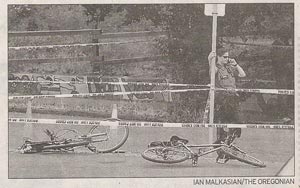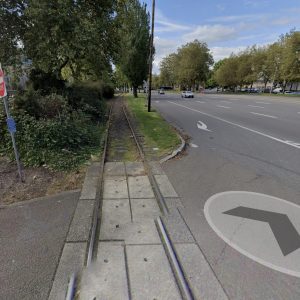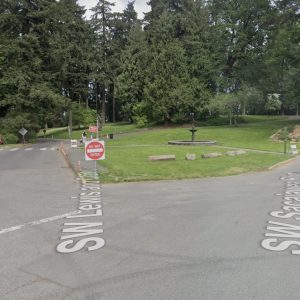A man who was involved in a bike-on-bike collision on August 12 has died after succumbing to major head injuries. The incident occurred on Bridge Pedal Sunday but was not related to the event.
According to Sgt. Brian Schmautz of the Portland Police Bureau, 56 year-old Daniel Hunt was riding his bike downhill on SE 11th Ave. when he struck 55 year-old David Ladeane (also on a bicycle). Ladeane was pulling out onto SE 11th from a parking lot just before SE Stark St. and Hunt hit him head-on (here’s a map of the intersection).
The collision caused Hunt to do a “face plant” and he suffered severe head injuries. Ledeane received only minor scrapes.
Neither rider was wearing a helmet.
This photo appeared in the Oregonian — along with a brief report — the day after the incident (August 13):

The story was also mentioned briefly on KOIN TV news. They reported that both men “appeared to be local transients”.
I learned of Hunt’s death from a reader today. I followed up on the information with the Multnomah County Medical Examiner’s Office and confirmed that Daniel Hunt died on August 21st from a skull fracture and sub-dermal dural hematoma.
Hunt’s family has been contacted and funeral arrangements have been made.







Thanks for reading.
BikePortland has served this community with independent community journalism since 2005. We rely on subscriptions from readers like you to survive. Your financial support is vital in keeping this valuable resource alive and well.
Please subscribe today to strengthen and expand our work.
Did the report indicate if alcohol or drugs were a mitigating factor?
So did Ladeane turn left going the wrong way on a one way street then? Seems like that is the only way it would be a head on…
That\’s right by St. Francis, they offer services to the homeless and there\’s always a lot of bike activity in the area.
I have been afraid of hearing news like this.
The more cyclists on the road the more we are potential hazards to each other.
It\’s a sorrowful, but helpful reminder to be visible, be safe, and ride defensively.
I do see a lot more cyclists on perpendicular cross streets these days.
I am sorry to hear of this tragedy but a good reminder that it is not always car on bike accidents. I\’ve had numerous encounters that almost ended badly due to another bike. And yes, I too am guilty of not always being aware of my surroundings.
Hmmm…skull fracture and sub-dermal hematoma, anybody wanna guess what PROBABLY would have helped? On the subject of other cyclists in the way, yesterday I had two fellow cyclists cross the eastern base of the St. John\’s bridge (where theris no marked crossing or signal) and although they waited for traffic, they acted oblivious to my presence and I\’m quite sure the woman with the cel-phone is still waiting for her piss stained pants to dry after our close call. We all need to be aware of not just the cars, but peds and each other out there.
We all need to be aware of not just the cars, but peds and each other out there.
And animals, and faults in the surface of the road, and debris…gosh, how about just *aware*? Fingers out of ears, hands on the bars instead of fiddling with an ice cream cone, thumb out of ass, and eyes scanning surroundings so we all stand a slightly better chance of not killing each other. How \’bout it?
The only thing that keeps the probability of being hit by another cyclist relatively low is the relatively low number of cyclists on the road.
Too many cyclists glibly blow through stop signs and red lights alike (I\’m not saying that\’s what happened here) on the lame theory that they are the only ones who will be hurt if there\’s a collision. As the number of cyclists rises, the probability of bike-on-bike collisions resulting from sheer failure to follow the rules of the road will begin to take a much higher toll on all of us.
R.I.P. Daniel Hunt
Wow, this is sure going to deflate that whole \”but when was the last time a bike ever killed anyone\” argument you always hear about how bikes shouldn\’t need to stop at stop signs and such…
Re: Post #1 – I assume you meant to say \”aggravating factor\” or \”contributing factor.\” A mitigating factor is one which lessens the harm of the conduct or allows an excuse for otherwise inexcusable conduct . . .
Please Helmet Zealots, we all know….
I\’m with N.I.K., post number 8…
Even if another bicyclist was not involved, he could have still been killed just by falling on his head w/out a helmet. To me, the problem with bicyclists is not potentially killing each other, it\’s that bicyclists put their own lives @ risk by not wearing helmets. –Karli
On a technical note, a subdermal hematoma would be blood under the skin – not likely to kill. I rather suspect the injury was a sub-dural hematoma, that is blood under the lining of the brain – a bad place to have a collection of blood putting pressure on things.
Don\’t worry Aaron, I don\’t think that one case versus 40,000+ a year is really going to deflate anything for anyone other than those who are already biased.
As we know, those people aren\’t really interested in facts anyway. Would you not agree Aaron?
That is the ultimate price to pay for not wearing a helmet. If he could speak to us now, he\’d be telling everyone to wear a helmet. It could have saved his life.
STOP – Helmet time
Enough with the helmet evangelism. The guy did a “face plant”. Nothing would\’ve helped in this case except a full face helmet.
wyatt, you don\’t know that only a full face helmet would have saved injury. A regular helmet could have helped because, if properly worn, could have been the first point of impact instead of the forehead.
But let\’s not debate that. And let\’s not refer to people who advocate helmet use as \”Zealots\” who engage in \”evangalism,\” lest we invite equally unflattering characterizations of those on the other side of the debate. We\’re not here to say I told you so, we\’re not here to speculate on what could have been, we just want to see fewer tragedies like this. We can all agree on that.
yep. helmets are good. people who get mad when other people point this out are bad.
have a nice day.
Oh, for crying out loud – unless you\’re a minor, helmet use is a personal decision. Sure, it probably would have saved this guy\’s life, but the most critical factor in this incident was speed. He\’s probably also wishing he\’d slowed down, had been more aware of his surroundings, or any number of other things.
This is *still* not a simple issue. Helmet use is only one factor, and like nearly all tragic crashes, there were multiple factors involved, any one of which if removed would have prevented the crash from occurring – turning it into merely a close call.
And yes, for the record I *do* wear a helmet, and I think others should do the same – I just think it\’s counterproductive to beat it into everyone\’s head at every opportunity.
I think the article speaks for itself. If someone reads it and decides they\’re not going to wear one anyway, then I don\’t think any amount of proselytizing is going to change that.
\”He\’s probably also wishing he\’d slowed down\”
This is semi-facetious, since he is, in fact, dead. I don\’t mean it to be disrespectful – just pointing out if he were still with us, I\’m sure he wishes he\’d done a number of things different. I know I did earlier this year when I collided with another cyclist on the Springwater.
\”[U]nless you\’re a minor, helmet use is a personal decision.\”
I assume you\’re referring to the helmet law here, meaning that because helmet use is not mandatory for adults, there are no legal repercussions. That\’s probably not true.
As rixter points out above, increased numbers of bicycles on the streets are causing increased numbers of collisions involving bicyclists. As a result, tort (civil) law regarding cycling is developing in Oregon. As it pertains to collisions, the law involves what constitutes negligence, i.e., what a reasonably prudent bicyclist does in various situations.
Oregon is a comparative fault state, meaning that your negligence can reduce your recovery in some circumstances even if the other person is also at fault.
In any civil suit over a collision in which your head is injured, the other party will argue that your failure to wear a helmet constitutes negligence. If successful, your award will be reduced by what the jury determines is your percentage of fault for not wearing a helmet.
Now, imagine the classic Portland cyclist scofflaw — iPod in the ears, blowing a red light, and riding the wrong way down the street. He plows into you at full speed, oblivious to your presence. You, not wearing a helmet, fall over and hit your head on the pavement. You suffer a TBI that leaves you unable to do your work for some period of time. You\’ve got bills to pay, mouths to feed, etc.
Thanks to his trustafarian roots, the scofflaw has the money to compensate you. But, sadly, a jury of your peers decides that you get only half of the money you need and deserve because of your personal decision not to wear a helmet. You\’re SOL.
My point here is *NOT* that you should wear a helmet. As we know from the non-stop drumbeat here, whether to wear a helmet is your personal choice. (Just don\’t apply for Medicaid when you\’re penniless and need medical care, because I pay for that and I am not responsible for your decisions.)
My point is that your \”personal decision\” not to wear a helmet *DOES* indeed have legal repercussions and that those repercussions can be profound indeed.
Can only picture the seen…dude riding out onto the street, no shirt on- smoke clenched in tooth, not looking in either direction and then meeting up with dude flyin\’ down 11th without a care- or clue in the world. Can\’t be good.
Just curious… if these two gentlemen were in fact homeless, are there organizations in SE that donate helmets?
Comment #25 – DK – \”dude riding out onto the street, no shirt on- smoke clenched in tooth\” – Did I miss this part in Jonathan\’s or are you just imagining this is how it was? I guess maybe you\’re trying to find, but I find it kind of tasteless. Just because the guy was transient & on a bike, he must have also been shirtless & smoking??
Regardless, this is a reminder to all of us who sometimes breeze thru signs that bikes (and hybrids, too, sometimes!) are quiet, so we may not hear or see them coming until we pull out. I saw a pretty nasty run-in between 2 bikers at Salmon & SE 32nd when a biker blew a stop sign. Luckily both bikers seemed okay, but this worries me that it will happen more as more bikers get on the road.
Geez, I need some lunch. I mean to say \”I guess you\’re trying to be funny\” not \”find\”. And I meant to say \”Jonathan\’s story\”.
It might be a personal decision to wear a helmet, and you might be thinking it\’s your life, but who pays the penalty in the end when you\’re a vegetable and need constant round-the-clock care? Your family and friends. Just remember that it\’s not all about you.
I live a few blocks from this intersection, and there are always accidents there- (usually cars) one recently involving myself. (not my fault!) People traveling south on 11th come down that slight hill very fast, and in the morning when the sun is low, it\’s hard to see the traffic light. Just saying. Its a sucky intersection.
I just wanted to share with folks that Danny Hunt was a beloved friend to many in the St. Francis community. I\’ve known him for about four years, and he certainly wasn\’t \’transient\’ during that time. He was present for dinner more often than not, frequently volunteered, and was generally full of humor. He will be dearly missed.
Sorry to hear that Steph. 🙁
Re a.O. post 24:
An attorney is kind of like a bike helmet– you don\’t need one until you need one. And they\’re not miracle workers– they can only work with the hand you deal them.
How you ride today affects what your attorney can do for you tomorrow. If you ride negligently, and you are injured, that is the hand you will deal your attorney.
There are a lot of people who take a tough guy stance and say that if they get inured, that\’s their problem. In other words, they don\’t care about the consequences of their actions. They are invariably \”pre-accident\” tough guys.
\”Post-accident,\” when rent is due, and the cupboards are bare, and they can\’t work, and may never work again, they suddenly do care about what happens to them, and they want their attorney to help them. And that is when they discover the true consequences– as outlined by a.O. above– of dealing their attorney a lousy hand.
One minor quibble:
the other party will argue that your failure to wear a helmet constitutes negligence.
Failure to wear a helmet is not negligence, but it does count against damages, for failure to mitigate. I think the effect is the same, though– it allows the other party to escape at least some of the financial consequences of injuring you.
I don\’t know if advocating being free to choose whether you wear a helmet of not constitutes and opposite side.
I think \”helmet zealot\” is an accurate description, because every time there is a bike accident and someone isn\’t wearing one, a bunch of people pipe up and blather on about how much better off the person would have fared with a helmet on, which may or may not be true. People get in accidents with helmetsON and die too. It is prosteletizing, because for the most part the people you are trying to reach don\’t want to listen, and often you are preaching to the choir. For instance, I wear a helmet.
Let\’s remember someone died here and that is a tragedy. That should be the beginning and end of it. My condolences to the friends and loved ones of Daniel Hunt.
If nobody ever discussed what could have been done, nobody can learn from these accidents, and that would be a tragedy.
I think you\’re right, SKiDmark, some people won\’t listen, and some people who will listen already wear helmets. But I also think there are people in the middle who may at least consider this accident as food for thought.
I also think there\’s more to learn from this accident than whether a helmet would have protected Daniel Hunt or not. Somebody— it\’s not at all clear who– violated the other cyclist\’s right of way. And now a cyclist is dead.
More food for thought.
My condolences too to the friends and family of Daniel Hunt.
My condolences as well.
Rixtir said:
\”Failure to wear a helmet is not negligence, but it does count against damages, for failure to mitigate. I think the effect is the same, though– it allows the other party to escape at least some of the financial consequences of injuring you.\”
Well, yes and no. Mitigation of damages as a concept sometimes may apply in a personal injury suit, but where the plaintiiff\’s alleged conduct may have contributed to the extent of the injury in the first place, the argument is comparative fault, not failure to mitigate. As an insurance defense attorney, which I used to be, the argument I would make in the no helmet scenario would indeed be comparative fault. An example of failure to mitigate, by contrast, would be a plaintiff who refuses to seek medical treatment post-injury.
Further, there is a substantive difference between the effect of the two defenses. A comparative fault defense can not only reduce a plaintiff\’s recovery, it can eliminate it entirely if the jury concludes that the plaintiff was more than 50% responsible for the injury. Failure to mitigate, on the other hand, will only reduce recovery, not eliminate it.
Is there a bike law course at LC? It seems that if there isn\’t – there will be one in the near future….
There is not a bike law course at L&C that I am aware of, but I recently attended the bike law *and injury prevention* CLE put on by Scott Kocher, Richard Vangelisti, with substantial help from Mark Ginsberg. Well, well worth the money.
I strongly believe that many of the non-legally educated cyclists here in PDX are unaware of the extent to which they are exposing themselves to legal risk by some of their actions. I hope they don\’t find out the hard way.
a.O., you\’re right, there is no bike law course at L&C. Nice to know about the bike law CLE, though– very interesting.
I strongly agree with what you\’re saying about the legal risk cyclists expose themselves to with some of their actions. There are two reasons I\’ve been a strong advocate of following the rules of the road, one of those reasons being encouraging cyclists not to harm themselves on the question of negligence. I\’m aware of at least one case where the question of the cyclist\’s failure to observe a traffic law– a failure that in no way contributed to the cyclist\’s collision with a motor vehicle– has given the opposing insurance company a straw to grasp at, resulting in a substantial effort on the part of the insurance company to deny the cyclist just compensation for life-altering injuries.
And thanks Cecil, for the clarification.
This is just a sad turn of events.
Am I the only one offended that KOIN TV News felt it necessary to say that the men \”appeared to be local transients\”? Why is that important to the story? Are they trying to minimize the humanity of these men; or am I just a bit touchy?
My thoughts are with the friends and family of Mr. Hunt.
\”Am I the only one offended that KOIN TV News felt it necessary to say that the men \”appeared to be local transients\”?
Joy,
in my opinion, the fact they were transients is an important part of the story… just as it would have been if they were messengers, elected officials, kids, senior citizens, etc….
part of a good news story is to give the reader or viewer a sense of the people involved.
anyone know if either were riding fixed-gears?
This is from the Oregonian today.
http://www.oregonlive.com/metro/oregonian/index.ssf?/base/news/1188527139125850.xml&coll=7
It appears that they have laid the blame on one of the cyclists.
Thanks for the reply, Jonathan. I often worry that classism is behind reporting that people are transients. While not entirely convinced this isn\’t the case, I can see your point of view on this and appreciate you giving me a little food for thought with your reasonable answer.
\”I\’m aware of at least one case where the question of the cyclist\’s failure to observe a traffic law– a failure that in no way contributed to the cyclist\’s collision with a motor vehicle– has given the opposing insurance company a straw to grasp at, resulting in a substantial effort on the part of the insurance company to deny the cyclist just compensation for life-altering injuries.\”
You should talk with Mark Ginsberg about this — it\’s an almost-daily occurrence for him and his clients.
That\’s the way the insurance companies do business. When my friend was hit by a car, the driver\’s insurance carrier did not even bother to ask him whether he had an attorney or had sought medical attention. They immediately gave him a low-ball offer for his destroyed bike and then sent him a check and a form for him to sign stating that he released the *entire* claim, including medical bills, etc. Scumbags. Of course, they didn\’t ask their counsel to do this because he would have been violating the ethical rules for lawyers. Scumbags. Did I say that already?
In addition to not realizing their exposure to legal risk generally, I think most cyclists also don\’t realize that behaviors that are not regulated by statute — such as adults wearing helmets — can create legal risk.
In the case I\’m referring to, the cyclist also received a lowball offer– basically, \”f-off and go away\” money. The lowball offer in no way even came close to the amount of damages suffered by the cyclist. It wouldn\’t even pay for the first day of the cyclist\’s medical bills, or one month\’s lost wages for this cyclist, let alone the medical bills the cyclist has already sustained, and will continue to sustain over a lifetime, or the wages the cyclist has already lost, and will continue to lose because the cyclist can never work again.
I really think that if cyclists were privy to some of the details of negligence cases where the insurance companies are screwing cyclists because the cyclist rode negligently– even in cases where the cyclist\’s violation of the law *did not* contribute to the accident– many cyclists would adopt a more sober view of their own cycling practices. Not every cyclist would, but many would.
Indeed.
Danny Hunt is my cousin and yes Danny was homeless (by choice). I wasn\’t at his funeral at St. Francis (I live in AZ) but five family members were and 70+ homeless. My sister said she has never seen such an outpouring of love and stories that were told that day. I was told (have not verified) that Mercy Hospital where he died (after removing life supports) donated 200 bike helmets to The Mission at St. Francis for homeless bike riders. Will they wear them? I can\’t answer that question – I hope so. Thank you for publishing this article in your publication. You did a better job on the story than the Oregonian.
kudos to Mercy Hospital for the helmet donation – that\’s impressive.